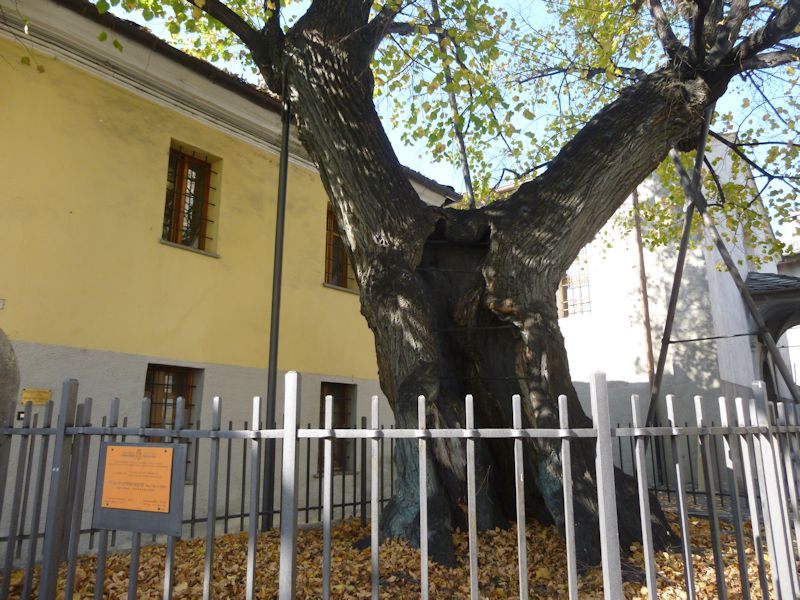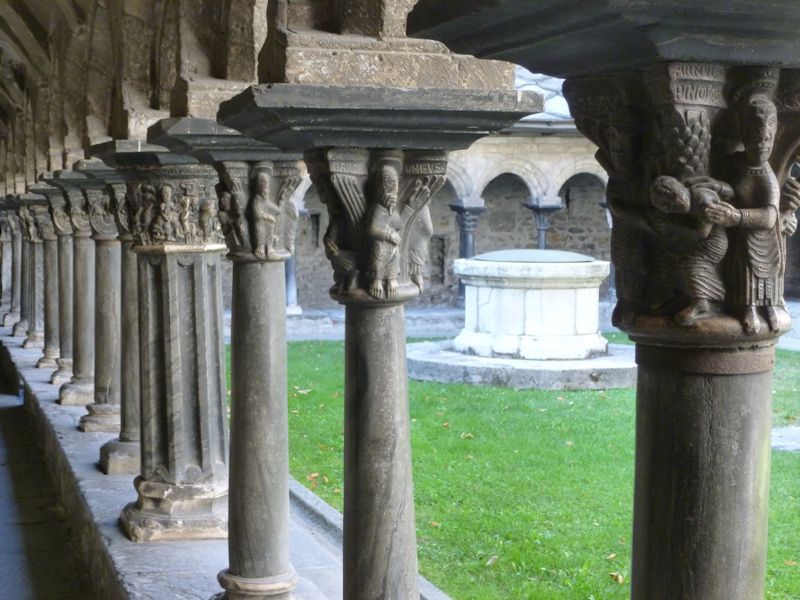You may not find this terribly rewarding unless you're included here, so this is a good time for casual and random browsers to turn back before they get too caught up in the sweep and majesty of the proceedings and can't let go.
Late October in Switzerland, and we'll take a break from our leisure.

A short drive over the Grand St-Bernard, and here we are at the Maison Bondaz. We've spent the rest of the first day sightseeing, with a very nice dinner of specialties of the terroir, and here we are on . . .
. . . the next day

Street scenes: St Anselm street looking towards the Praetorian Gate

Today's agenda, I'm told, includes a stop-in at the Tuesday street market, a little more sightseeing, and then a nice hike up in the Valpelline.

Kristin has never passed up a street market, even those that specialize only in plastic household items and chinese-made clothing.

-- I'll take the Grumpy one please.

"Style comes in all shapes and sizes; therefore the bigger you are, the more style you have."

What we're looking for, in fact, is a little plastic water bowl for The Squirrel, and we found it.


Apartments up against the Roman city wall


The Praetorian Gate again


A stop back at the Maison Bondaz to stow our street market purchases

Several levels of security

Downtime on the sunny balcony, with an improving book

And now we're off to Sant'Orso's

The little piazza outside Sant'Orso's church, and a great whacking tree

When in about 1540 a terrible wind blew down an ancient elm tree here, which supposedly had been planted by Saint Ursus himself, this linden tree was planted to replace it. A terrible wind in 1951 split open the trunk of it, but it's carrying on very well regardless.

The collegiate church of St Ursus of Aosta, and its belltower

The Church of San Lorenzo (St Lawrence) nearby has got some 5th century paleochristian excavations, but "No Photos!", so we'll get on with St Ursus straightaway.

The belltower dates from 989 but was rebuilt in the 12th century, when it was one of a pair joined by a defensive wall around the church complex.

The church of Sant'Orso: Orso, or Ursus, is said to have been a 6th century Irish cleric who was serving as archdeacon to the Bishop of Aosta when the deceased bishop was replaced by a follower of the Arian heresy. Orso was so offended that he and some of his colleagues split off and set up their own church down the street from the cathedral, on the grounds of an ancient necropolis.

The present church was built over Orso's original buildings in the 11th century, apparently by the same Bishop Anselm (not Anselm of Canterbury) who rebuilt the Aosta cathedral as well.

The central aisle with ribbed gothic vaults



More arrows than St Sebastian usually gets, poor sod.

An insistent rat in the lower right, an amused dragon under the Angel Michael's sword on the left, and Baby Jesus grasping a crow. Cool.

The crypt, with (evidently) the relics of St Ursus himself (though St Gratus of Aosta is also around here somewhere)

The centre apse and choir, with a recently uncovered mosaic

It's got Samson killing a lion on it. For some reason.

The carved wooden choir from the 15th century, with its frequently irreverent decorations

Some of them, not so much irreverent as rude.



We're on our way to see the famous cloister, straight through that passage on the left. Just outside Sant'Orso church is the priory of the same name, a fancy, mostly Renaissance-style residence built in about 1500 by George of Challant, then prior of the church. The Challant family were also the owners of the Castle of Fenis down the valley a ways.

Brilliant, but not open to the public (us)

An octagonal Gothic-style tower

We're into the cloister ("No Photos", so I have to be discreet). The beautiful Romanesque arrangement dates to before 1133.

Most interesting are the columns and double columns all the way around.

Some of the capitals have simple romanesque decorations, but many . . .

. . . depict scenes from the Bible and from the life of St Orso.

Cloister scenes


Amazing. But what about our walk in the Valpelline.
Off to the Valpelline

Along St Anselm's street towards one of the free carparks just outside the pedestrian zone -- we're driving up into the mountains to hike a bit and relive old memories for one of us.

More Aostan woodcarving ('Harvesting the honey and hay', Fernando Casetta, 2010)

Kristin just cannot resist a menu.

At the end of the street, the Arch of Augustus, built in 25 BC in honor of the emperor at the time of the founding of the Roman city here.

Here's the Lago di Place Moulin at the head of the Valpelline.




 Dwight Peck's personal website
Dwight Peck's personal website
















































